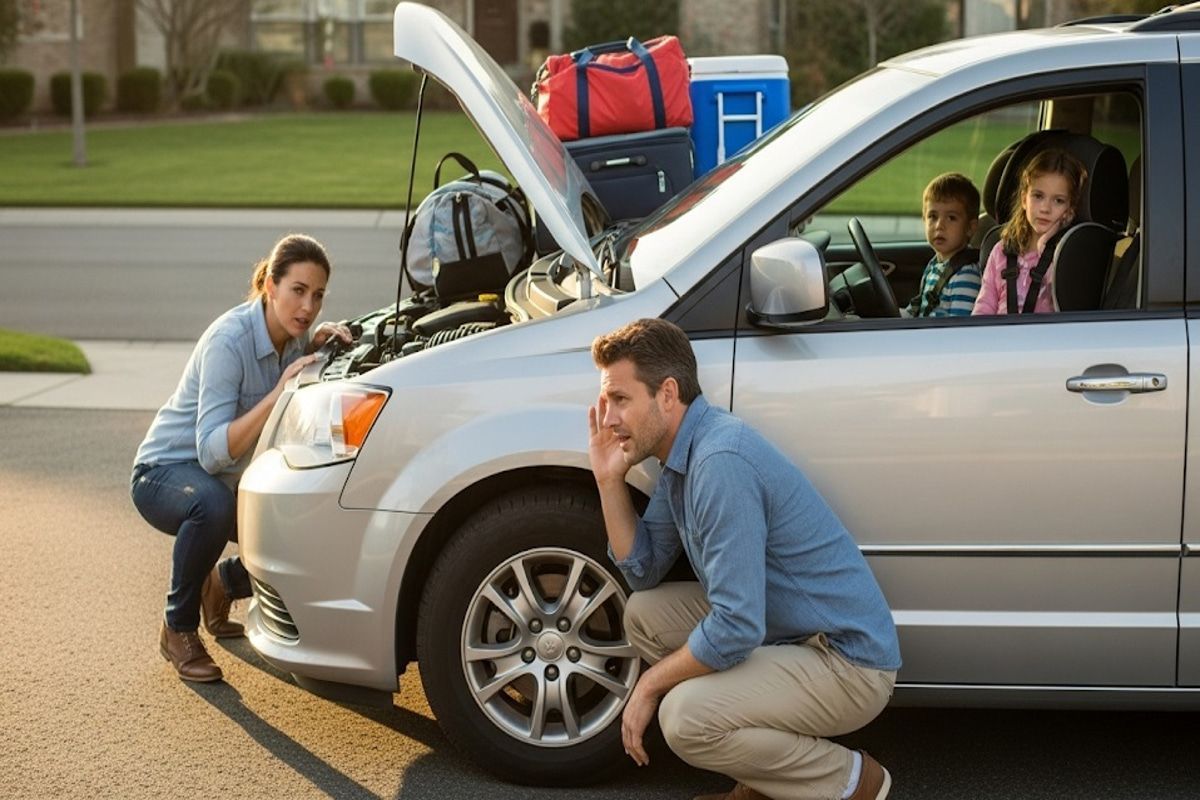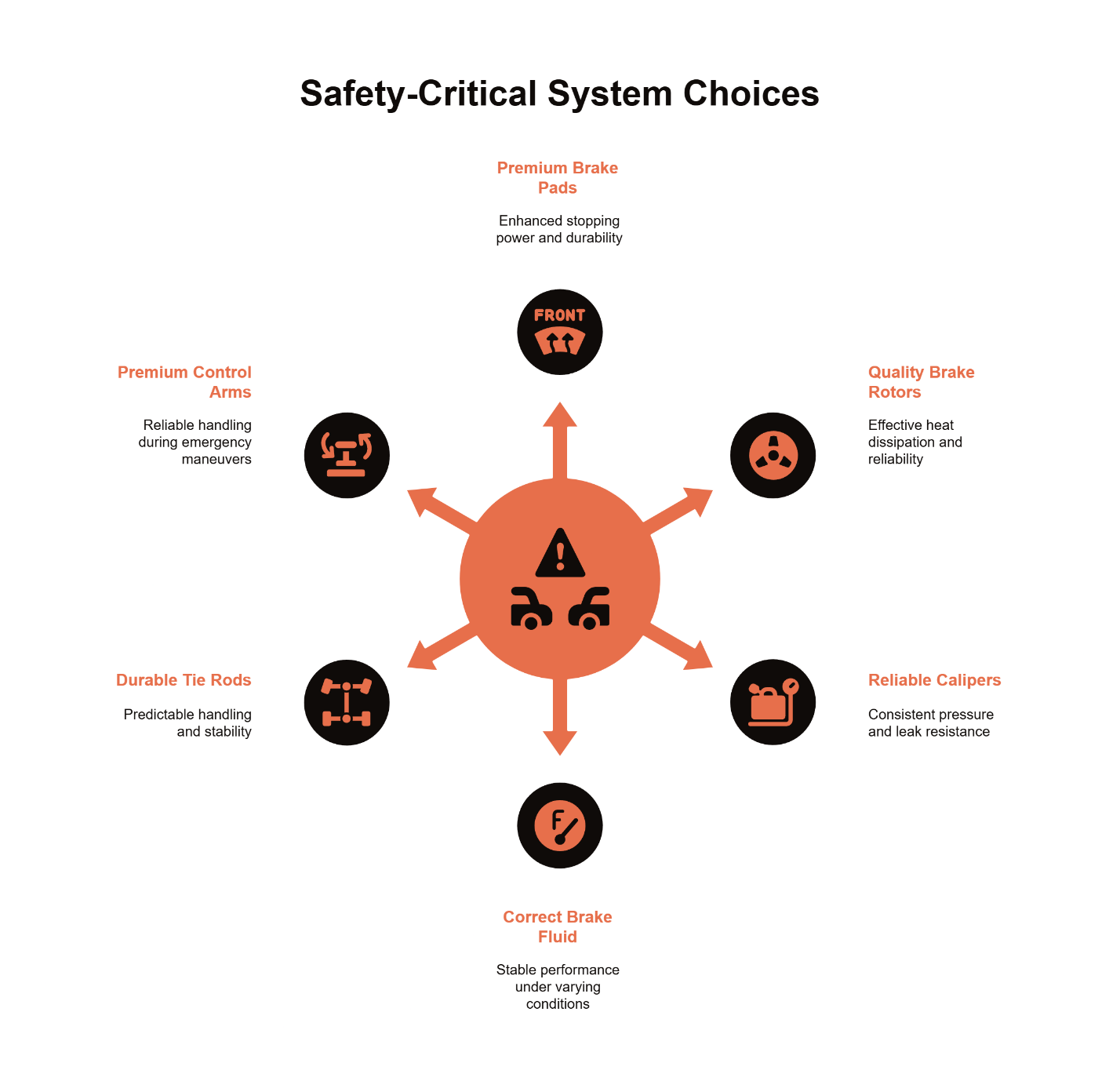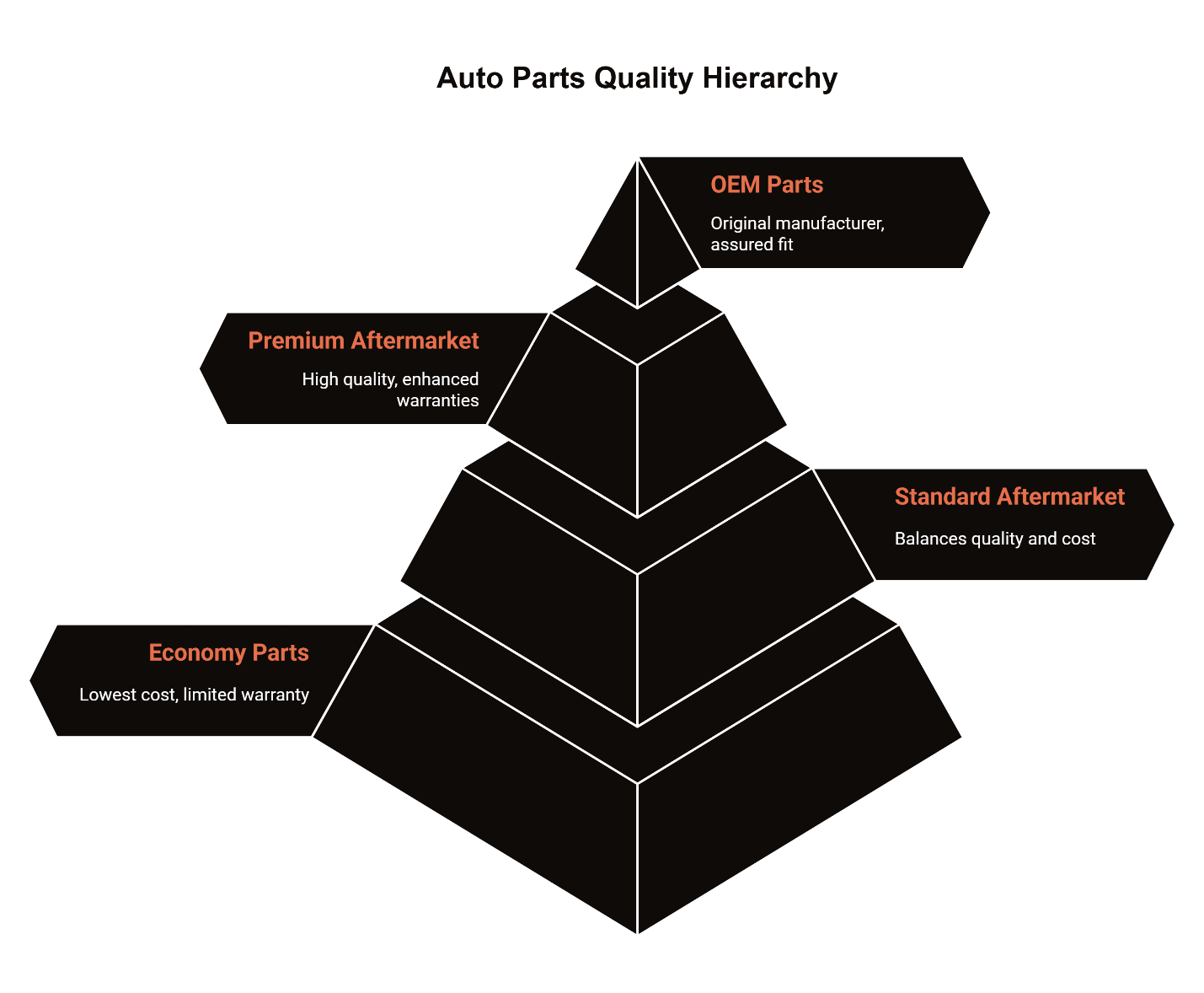
Auto Repair Component Hierarchy: Which Parts Should Never Be Budget Options
Key Takeaways:
- Safety-Critical Components: Never compromise on braking system parts (pads, rotors, calipers, fluid) and steering components (tie rods, ball joints, control arms), as they directly affect your family's safety on the road.
- Reliability Systems: Invest wisely in engine management components (oxygen sensors, fuel injectors, timing parts) and cooling system components (water pump, thermostat, radiator) to prevent expensive cascade failures and being stranded.
- Cost-Balanced Areas: For transmission components and electrical systems like alternators and starters, mid-grade options often provide reasonable reliability while allowing some budget flexibility.
- Smart Shopping: Request explanations of part quality tiers, get written quotes specifying part types, prioritize safety systems, and consider your local driving conditions when making decisions.
The component hierarchy outlined in this article helps vehicle owners make informed decisions that balance budget concerns with safety and reliability needs for family vehicles.
That concerning noise from your minivan? It's back. With family vacation just weeks away and bills already stacking up, another repair quote feels like the last thing you need.
Every vehicle owner faces this moment eventually. Balancing limited budgets against your family's safety creates genuine tension. Which auto components can you save money on without compromising safety, and which ones deserve the extra investment despite the higher cost?
Before diving into part quality, make sure the problem has been accurately diagnosed. Even premium parts won't solve a misdiagnosed issue—they'll just cost you more for no reason. A thorough diagnostic process prevents unnecessary replacements and ultimately saves you money. When seeking help, consider visiting reputable auto repair shops in Anaheim, CA that specialize in accurate diagnostics before recommending parts.
This guide breaks down vehicle components into a practical hierarchy, helping you make informed decisions that protect both your family and your finances.
Safety-Critical Systems: Never Compromise

When it comes to components directly responsible for keeping your family safe on the road, quality should never be sacrificed for cost savings. The consequences of failure in these systems could be catastrophic.
Braking System Components
The ability to stop your vehicle reliably isn't something you want to question. Ever.
- Brake pads: Premium pads typically offer better stopping power, reduced noise, and longer lifespan. That difference between economy and premium pads? You'll notice it most during that heart-stopping moment when you need to slam on the brakes.
- Brake rotors: Quality rotors dissipate heat more effectively, helping prevent brake fade during repeated stops. This matters tremendously when you're descending a long mountain road or caught in stop-and-go traffic on a sweltering summer day.
- Brake calipers and hydraulic components: These control the pressure that applies your brakes. Quality components maintain proper pressure and resist leaks better—the difference between stopping safely or not stopping at all.
- Brake fluid: Often overlooked, but absolutely critical. Premium fluids maintain their properties longer under varying temperature conditions. Always use the manufacturer-specified type (DOT 3, DOT 4, DOT 5.1). Using the wrong type? Recipe for disaster, especially under demanding conditions.
Steering and Suspension Components
These systems control your vehicle's direction and stability—particularly crucial during emergency maneuvers or when navigating challenging road conditions.
- Tie rods and ball joints: These connect your steering wheel movement to the actual turning of the wheels. When these parts wear or fail, they can dramatically affect handling predictability and directional stability. In severe cases? Complete loss of steering control. Not worth saving a few bucks.
- Control arms and bushings: These maintain proper wheel alignment and absorb road impacts. Premium components provide more reliable handling, particularly during emergency maneuvers. They directly affect your vehicle's stability when you need to swerve suddenly to avoid an obstacle.
+-------------------------------------------------------------------------------------------------------+
💡 Quick Takeaways
- Safety First: Prioritize quality for braking and steering components as they directly affect your family's safety on the road.
- Heat Management: Quality braking components handle temperature variations better, reducing the risk of brake fade during demanding driving conditions.
- Control Importance: Premium steering and suspension parts ensure reliable vehicle stability during emergency maneuvers.
+-------------------------------------------------------------------------------------------------------+
Reliability-Critical Systems: Invest Wisely
These systems may not cause immediate accidents if they fail, but they can leave your family stranded or trigger expensive cascade failures that affect multiple vehicle systems.
Engine Management Components
- Oxygen sensors and fuel injectors: These directly control your engine's fuel mixture. Quality components help maintain proper engine operation, fuel economy, and may prevent damage to expensive catalytic converters.
- Timing components: This includes timing belts, chains, and tensioners that keep engine valves and pistons synchronized. Failure often results in catastrophic engine damage. Extreme temperature fluctuations can accelerate wear on these components. Following manufacturer-recommended replacement intervals isn't just a suggestion—it's mandatory.
Cooling System Parts
Regions with higher temperatures make these components especially critical:
- Water pump: Circulates coolant throughout the engine. Quality pumps often have better seals and bearings that withstand temperature fluctuations more effectively.
- Thermostat: Controls engine operating temperature. Premium thermostats respond more accurately to temperature changes and resist sticking—preventing overheating emergencies.
- Radiator: Dissipates engine heat. Quality radiators generally have better heat transfer capability and more durable materials that resist corrosion from coolant chemicals.
- Coolant: Similar to transmission fluid, it's crucial to use the manufacturer-specified type of coolant (OAT, HOAT, or IAT). Using the wrong type leads to corrosion, seal damage, and cooling system inefficiency—even if it's marketed as "high-quality."
+-------------------------------------------------------------------------------------------------------+
💡 Quick Takeaways
- Prevent Cascade Failures: Quality engine management components help prevent damage to more expensive parts.
- Climate Considerations: In warmer climates, cooling system quality becomes especially important for family vehicles.
- Stranded Prevention: Investing wisely in these systems helps prevent being stranded with children in uncomfortable or unsafe situations.
+-------------------------------------------------------------------------------------------------------+
Long-Term Value Systems: Balance Quality and Cost
These systems allow more flexibility in balancing quality with budget concerns, though higher quality still typically delivers better long-term value.
Transmission Components
- Transmission filters and fluids: While less expensive options exist, quality products generally better protect the expensive transmission components, especially when dealing with stop-and-go traffic. Crucially, always ensure the transmission fluid meets the exact specifications recommended by your vehicle's manufacturer. Using the wrong type can lead to significant damage, regardless of its perceived quality. Each transmission is designed to work with a specific fluid formulation, and using an incorrect specification can result in erratic shifting, overheating, accelerated wear, and potentially complete transmission failure.
Electrical System Components
- Alternator and starter: Mid-grade options often provide a reasonable balance between cost and reliability. However, in warmer climates, investing in better quality might help prevent being stranded at inopportune moments with family in tow.
Understanding Auto Parts Quality Tiers

When shopping for parts, you'll typically encounter several different quality tiers. Understanding these differences helps you make better decisions:
OEM (Original Equipment Manufacturer) Parts
These are made by or for the vehicle manufacturer and are identical to what came on your vehicle when new. They generally offer:
- Assured fit and quality consistent with the vehicle's original specifications
- Often come with a substantial warranty (typically one year)
- Usually the most expensive option
- Available primarily through dealerships
Premium Aftermarket Parts
High-quality alternatives to OEM parts, often made by reputable suppliers:
- May equal or sometimes exceed OEM quality in specific applications
- Often include enhanced warranties, sometimes lifetime coverage
- Priced lower than OEM but higher than standard aftermarket parts
- May include improved designs that address known weaknesses in OEM parts
Standard Aftermarket Parts
Mid-tier options that balance quality and cost:
- Usually adequate for most normal driving conditions
- Moderate warranty protection (often 6 months to 1 year)
- Significantly more affordable than OEM or premium options
- Quality can vary between manufacturers
Economy Parts
The lowest-cost option available:
- May have shorter lifespans than other options
- Limited or no warranty coverage
- Significantly cheaper than other alternatives
- Most suitable for older vehicles or temporary repairs
Labor Costs vs. Parts Costs
When considering repair expenses, remember that labor often represents a significant portion of the total bill. This has important implications for your parts decisions:
- Labor Intensity: Some repairs require several hours of work but relatively inexpensive parts. In these cases, choosing higher-quality components makes economic sense since labor costs will be the same regardless of part quality.
- Repeat Repairs: If an economy part fails prematurely, you'll pay the labor costs twice. For labor-intensive repairs, investing in quality parts often proves more economical in the long run, even if the initial expense is higher.
- Cost Analysis Example: A $50 premium part that lasts twice as long as a $30 economy part represents significant savings when the labor to replace it costs $200 each time.
Making Informed Decisions
When working with repair shops, consider these strategies to ensure you're getting appropriate quality parts:
- Ask about part quality tiers: Most components come in good-better-best options. Request an explanation of the differences and implications.
- Request written quotes specifying part types: This should indicate whether parts are OEM, premium aftermarket, standard aftermarket, or economy grade.
- Inquire about warranties: Better quality parts typically come with longer warranties. This is valuable both for peace of mind and as an indicator of the manufacturer's confidence in their product.
- Prioritize spending on safety systems: Be willing to invest more in the safety-critical components identified above.
- Consider your driving conditions: Climate and traffic conditions in your region increase stress on different vehicle systems.
Conclusion
Maintaining a family vehicle involves countless decisions balancing budget against reliability. The peace of mind that comes from investing in quality safety-critical components often outweighs the modest savings of budget alternatives.
That concerning noise in your minivan? It deserves quality attention, especially if it involves any safety or reliability systems. Use this component hierarchy next time you're reviewing a repair quote from vehicle repair shops. Your family—and your long-term budget—will thank you.
Frequently Asked Questions
How can I verify that an auto repair shop is using the quality of parts I'm paying for?
Ask for the part brand names and part numbers on your invoice. Quality shops should be willing to show you the actual parts packaging and explain why they recommend specific quality levels for different components.
What questions should I ask my mechanic about component quality before approving repairs?
Ask about how different quality tiers might affect longevity, warranty coverage for different options, and how the quality choice might affect other connected systems in your vehicle.
Beyond the Obvious
How do environmental factors affect component quality requirements?
Heat can accelerate the breakdown of rubber components and fluids. Quality cooling system parts, brake fluids, and belts may become even more important in warmer climates to help reduce the chance of premature failure during higher temperatures.
Why might premium components be more economical compared to budget options over time?
Many premium components tend to last significantly longer than budget alternatives and can help prevent damage to related parts. When calculating true cost, consider not just the component price but also the labor for more frequent replacements, potential towing costs, and the inconvenience of being stranded with children.
🚗 Keep Your Family Safe—Without Overspending
At Orange Independent Auto Repair, we know what it means to balance family budgets with vehicle safety—because we’ve been doing it for over a decade. Our trusted auto repair services in Orange, Anaheim, Tustin, Villa Park, and Yorba Linda are designed to give you accurate diagnostics first, so you never pay for unnecessary parts or labor. Whether it’s that mysterious noise in your minivan or a routine safety check before your road trip, we help you make smart, value-driven decisions without compromising your family's well-being.
Need expert advice or a second opinion on a recent quote?
📞 Call us today at (714) 633-7161 to speak with a certified technician who puts safety and transparency first.
🔧 Prefer to explore your options first?
Browse our site to learn more about part quality, warranties, and the repair services we specialize in—from European classics to everyday family vehicles.
👉 Let’s protect your peace of mind—reliability starts with the right repair shop.
Follow us for expert auto tips & local insights: Facebook - Orange Independent Auto Repair.

